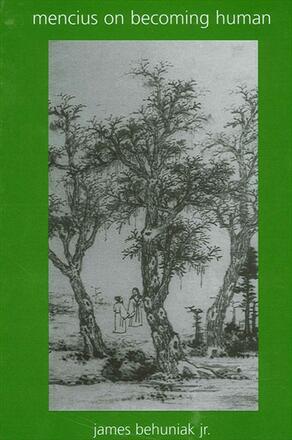
Mencius on Becoming Human
Alternative formats available from:
A new interpretation of the Confucian classic, the Mencius, based on both traditional sources and newly discovered documents.
Description
Using current research from traditional sources and newly unearthed documents dating from the Warring States period (403–221 B. C.E. ), Mencius on Becoming Human offers a timely interpretation of a central text in the Confucian canon. The author carefully reconstructs the philosophical assumptions that underwrite the teachings of the Mencius, returning the text to its native intellectual world. The result is a compelling new reading of an ancient classic, one that is both sensitive to the details of historical context and contemporary in its philosophical implications.
James Behuniak Jr. argues that the notion of an essential, ahistorical "human nature" is not part of the process of "becoming human" outlined in the Mencius. Rather, becoming human is described as a process of developing a qualitatively "human" disposition within specific cultural and historical conditions as these are understood within a Warring States cosmology. The central themes of the Menciusthe importance of family, moral development, and human advancementare each discussed within this reconstructed framework.
James Behuniak Jr. is Assistant Professor of Philosophy at Sonoma State University. He is coeditor (with Roger T. Ames) of The Mencian Conception of Human Nature.
Reviews
"…Behuniak provides a comprehensive reading of the Mencius, ranging from cosmology and metaphysics to familial relations and human ethical development. This reading is frequently enlightening, sometimes surprising, and consistently interesting. Behuniak displays a thorough knowledge of Warring States texts and a remarkable ability to draw these together into a coherent perspective on the Mencius. " — Philosophy East & West
"In this book James Behuniak Jr. has clearly identified a central question in Chinese philosophy—what it is to be human. The book is boldly interpretative in its main thesis, and this thesis is sustained throughout and developed in various ways. It is also insightful in places … The breadth of scholarship is impressive … The thesis of the book may be controversial, but this is the stuff of philosophical hermeneutics, out of which further insights (to use a botanical metaphor) will grow. " — Dao
"…a highly unified interpretation of a text whose interest lies, in part, in its intellectually dynamic contradictions. " — China Review International
"This work is neatly balanced between commentary and independent philosophic study. It exemplifies what modern comparative philosophy ought to be. The author is faithful to the original materials and seeks to link the Mencius to current philosophic debates by presenting the Mencius text in light of the theme of becoming human. " — John H. Berthrong, author of Concerning Creativity: A Comparison of Chu Hsi, Whitehead, and Neville